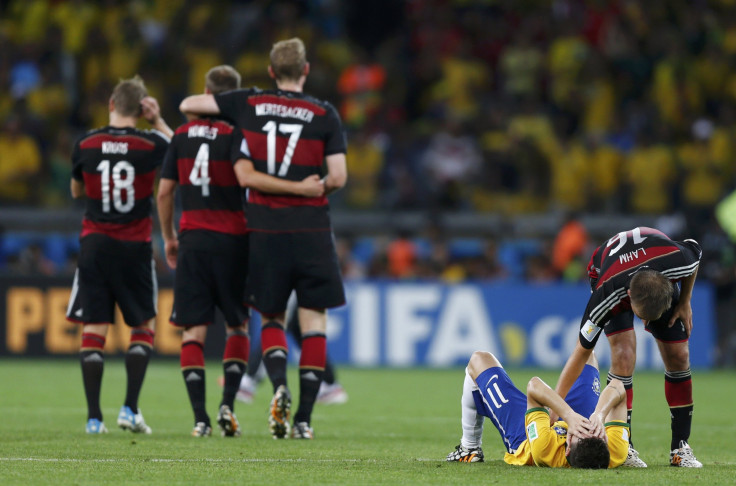After 7-1 Destruction Of Brazil, Classy Germans Tweet Support For The Losers

By now it’s not news that Brazilians have reacted badly to their national team’s 7-1 destruction by Germany in the World Cup. From street rioting to headlines evoking a national tragedy, the soccer-mad nation hasn’t taken well a defeat that marks its lowest moment in the sport. But what about the people who inflicted on them the worst defeat ever for a World Cup host country? What are the Germans saying of their unexpected, unprecedented triumph?
They are being restrained, in fact. And they are even proclaiming their support and affection for the team they have crushed beyond any expectation. Immediately after routing Brazil in Belo Horizonte on Tuesday in the most lopsided World Cup semifinal of all time, the German players seemed to realize that what they had done wasn’t normal -- and they adjusted their behavior accordingly. In a stadium packed with tens of thousands of people they had just stunned, they cut the theatrics from their celebrations. Arms held high, sure, but no jumping and no screaming: pretty tame stuff, all things considered, for a team that had just made the final of the biggest sporting event in the world.
And the next day, some of the German team’s top players and their country’s soccer federation took to Twitter to express support for the Brazilians. On Wednesday, forward Mesut Özil tweeted a picture of two Brazilian fans on the verge of tears, with a heartfelt sentiment. “You have a beautiful country, wonderful people and amazing footballers-this match may not destroy your pride! #Brasil,” he wrote. His words clearly struck a chord, getting retweeted more than 60,000 times and counting.
you have a beautiful country, wonderful people and amazing footballers-this match may not destroy your pride! #Brasil pic.twitter.com/lI2TXeVCUY
- Mesut Özil (@MesutOzil1088) July 9, 2014His teammate Lukas Podolski went even further, with a string of hashtags in Portuguese that included “Hold your head up!” and “Brazil, I love you” -- and adding a message in Portuguese that paid tribute to the great Brazilian tradition in the sport.
#ForçaBrasil #LevanteACabeça #BrasilÉTradição #RespeiteASeleção #JogaBonito #Futebol #BrasilTeAmo LP10 ❤️ pic.twitter.com/SwsEPCkWDw
- Lukas-Podolski.com (@Podolski10) July 9, 2014“Respect the yellow jersey with its history and tradition. The world of soccer owes a lot to Brazilian soccer, which is and will always be the land of soccer. Victory is the consequence of work. We came determined. We all grew up watching Brazil play, our heroes who inspired us are all from here,” wrote Podolski (punctuation added for clarity.) “Riots in the streets, confusion, protests will not solve or change anything. When the Cup ends and we leave, everything will go back to normal. Then (there will be) much peace and love for this wonderful people, a humble, tough-fighting and honest people and a country I learned to love.”
A bit condescending, maybe, but sincerely heartfelt -- and a meaningful message from someone who learned the game in Europe, where promising young players with dazzling moves are used to hearing the coach yell “You think you’re Brazilian?” when they try something deemed too flashy.
The messages may even have been a coordinated PR effort led by the DFB, the German soccer federation, which tweeted maybe the most moving message of support for the humbled opponents, by referencing Germany’s own debacle on home turf -- the semifinal loss to Italy, two World Cups ago.
“We have known since 2006 what it is like to lose a semifinal in one’s own country. Head up! And all best wishes for the future!” said the tweet in German, accompanied by photos of Brazilians and Germans embracing on the field and in the stands on Tuesday. And to make sure that the message got across, it was repeated in Portuguese. That version got three times as many retweets as the German one, an indication that the gentlemanly behavior of the victors did not go unnoticed by the losers.
Seit 2006 wissen wir, wie es ist, ein Halbfinale im eigenen Land zu verlieren. Kopf hoch! Alles Gute für die Zukunft! pic.twitter.com/jG6fRzHDRd
- DFB-Team (@DFB_Team) July 9, 2014© Copyright IBTimes 2025. All rights reserved.






















